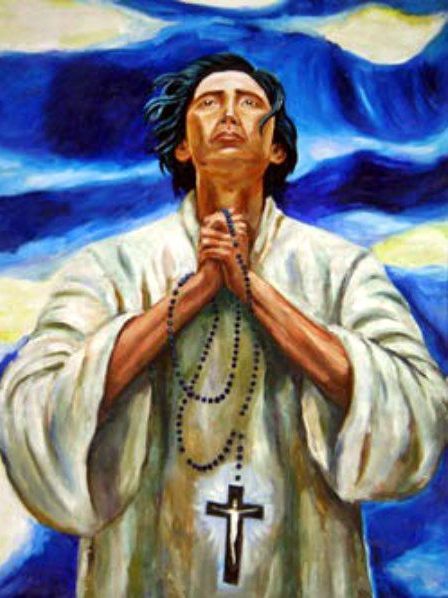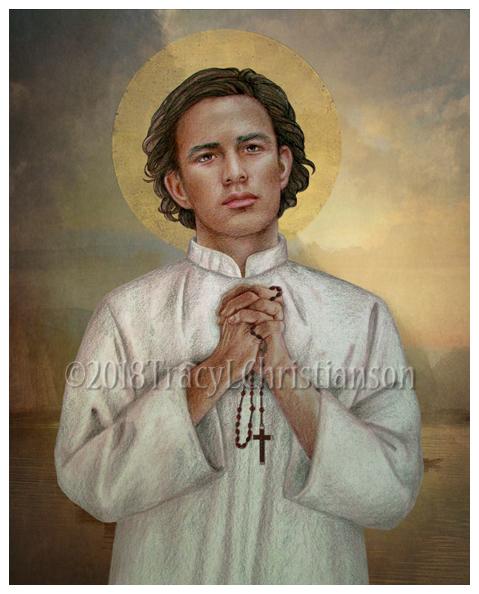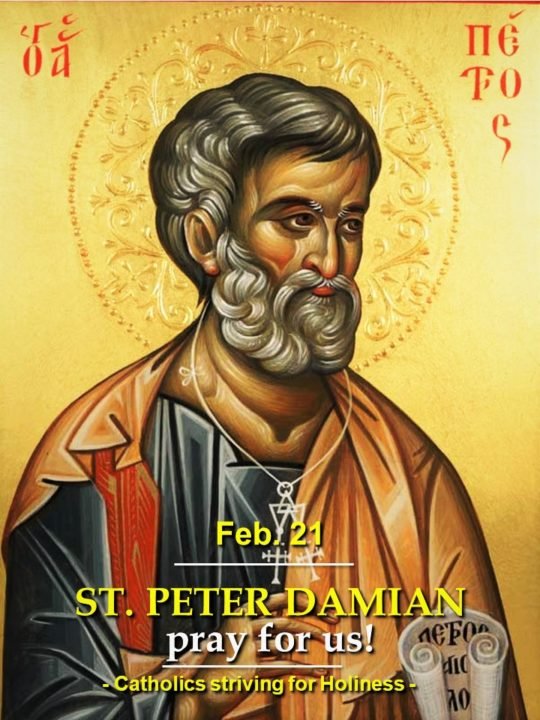Sept. 28: ST. JOHN PAUL II ON ST. LORENZO RUIZ AND THE MARTYRS OF NAGASAKI.

From the homily of St. John Paul II on Lorenzo Ruiz and companion martyrs of Nagasaki during their canonization
Today’s canonization of Blessed Lorenzo Ruiz and his companions, martyred in and around Nagasaki between 1633 and 1637, constitutes an eloquent confirmation of these words. Sixteen men and women bore witness, by their heroic sufferings and death, to their belief in the message of salvation in Christ which had reached them after being proclaimed from generation to generation since the time of the Apostles.
In their sufferings, their love and imitation of Jesus reached its fulfilment, and their sacramental configuration with Jesus, the one Mediator, was brought to perfection. “For if we have been united with him in a death like his, we shall certainly be united with him in a resurrection like his” (Rom. 6, 5).
These holy martyrs, different in origin, language, race and social condition, are united with each other and with the entire People of God in the saving mystery of Christ, the Redeemer. Together with them, we too, gathered here with the Synod Fathers from almost every country of the world, sing to the Lamb the new song of the Book of Revelation:
“Worthy are you to receive the scroll and to break open its seals,
for you were slain and with your blood you purchased for God those from every tribe and tongue, people and nation. You made them a kingdom and priests for our God, and they will reign on earth” (Apoc. 5, 9-10).
The martyrs’ message of supreme fidelity to Christ speaks to Europe, with its common Christian foundation laid by the Apostles Peter and Paul – Europe, which has been a seedbed of missionaries for two thousand years.
It speaks to the Philippines, which was the place of immediate preparation and strengthening in faith for eleven of the new Saints – the Philippines which, as I remarked on the occasion of the martyrs’ Beatification in Manila in 1981, from being evangelized is called to become an evangelizer in the great work of bringing the Gospel to the peoples of Asia. May this task of evangelization begin in Philippine families, following the example of Lorenzo Ruiz, husband and father of three children, who first collaborated with the Dominican Fathers in Manila, and then shared their martyrdom in Nagasaki, and who is now the first canonized Filipino saint. The Holy martyrs speak to the Church in Japan, particularly to the Archdiocese of Nagasaki, to the Church in Taiwan and in Macao and to all Christ’s followers in Asia: may the example and intercession of the new Saints help to extend Christian truth and love throughout the length and breadth of this vast continent!

From a sermon by Pope John Paul II at the beatification of the martyrs of Nagasaki
In shedding their blood they offered God a great act of worship and love
According to his Gospel promise, Christ is truly acknowledging, in the presence of his Father in heaven, those faithful martyrs who acknowledged him before men.
The hymn of glory to God which has just been sung by numberless voices is an echo of the Te Deum sung in the Church of Santo Domingo on the evening of December 27, 1637, when the news arrived of the martyrdom at Nagasaki of a group of six Christians. Among them were the head of the mission, Father Antonio González, a Spanish Dominican from León, and Lorenzo Ruiz, a married man with a family, born in Manila extra muros: in the suburb of Binondo. These witnesses had also in their turn sung psalms to the Lord of mercy and power, both while they were in prison and during their execution by the gallows and the pit, which lasted three days.
Faith conquers the world. The preaching of this faith enlightens like the sun all who wish to attain the knowledge of truth. Indeed, although there are different languages in the world, the power of the Christian tradition is the same.
The Lord Jesus by his blood truly redeemed his servants, gathered from every race, tongue, people and nation, to make them a royal priesthood for our God.
The sixteen blessed martyrs, by the exercise of their priesthood – that of baptism or of Holy Orders – performed the greatest act of worship and love of God by the sacrifice of their blood united with Christ’s own Sacrifice of the Cross. In this way they imitated Christ the priest and victim in the most perfect way possible for human creatures. It was at the same time an act of the greatest possible love for their brethren, for whose sake we are all called to sacrifice ourselves, following the example of the Son of God who sacrificed himself for us.
This is what Lorenzo Ruiz did. Guided by the Holy Spirit to an unexpected goal after an adventurous journey, he told the court that he was a Christian, and must die for God: “Had I many thousands of lives I would offer them all for him. Never shall I apostatise. You may kill me if that is what you want. To die for God – such is my will”.
Here we have him summed up; here we have a description of his faith and the reason fοr his death. It was at this moment that this young father of a family professed and brought to completion the Christian catechesis that he had received in the Dominican Friars’ school in Binondo: a catechesis that cannot be other than Christ-centred, by reason both of the mystery it contains and the fact that it is Christ who teaches through the lips of his messenger.
The example of Lorenzo Ruiz, the son of a Chinese father and Tagala mother, reminds us that everyone’s life and the whole of one’s life must be at Christ’s disposal. Christianity means daily giving, in response to the gift of Christ who came into the world so that all might have life and have it to the full.
Stay updated: subscribe by email for free TO OUR NEW WEBSITE www.catholicsstrivingforholiness.org (PUT YOUR EMAIL IN THE SUBSCRIBE WIDGET).
We are also in www.fb.com/Catholicsstrivingforholiness. Kindly help more people in their Christian life by liking our page and inviting your family, friends and relatives to do so as well. Thanks in advance and God bless you and your loved ones! Fr. Rolly Arjonillo

